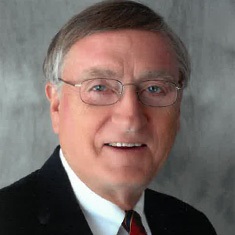The University of Iowa Eight Over 80 Award
James Kimball (64MD)
James Kimball has strong passions for medicine, aviation, the arts, and economic development.

After graduating from Iowa and serving in the U.S. Army during the Vietnam War—receiving a Bronze Star for his service to his country—Kimball worked in family medicine for nearly six decades. He delivered more than 1,000 newborns in Osceola and helped and supervised another 10,000 deliveries at Broadlawns Medical Center in Des Moines. Throughout his medical career, Kimball won various awards and provided leadership to numerous organizations, including winning the Iowa Medical Society Physician’s Community Service Award.
While medicine was his professional passion, Kimball made a big impact in his community. As president of the Clarke County Development Corporation, he worked to have Lakeside Casino and Hotel built in Osceola, which has resulted in millions of dollars in revenue for local communities.
Today, he serves as a senior aviation medical examiner and certifies over 200 pilots per year. He also started the Kimball Foundation, which provides scholarship opportunities for area students who are admitted to an accredited medical school. Kimball continues to host a radio show in Osceola and supports, as well as acts in, local arts productions.
